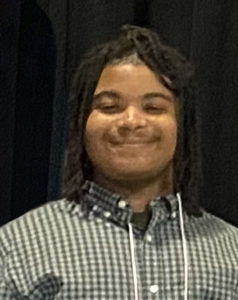Everitt Price is part of the cohort of youth researchers in the Youth Action Researchers at the Intersection project. He researched the question: How can historically marginalized students pursue meaningful paths and healthy careers after high school?”
Meet the Student Researcher

Everitt Price (he, him)
Family members: Mom, grandma and three sisters
Favorite song: Dream On by Aerosmith
What would people not know just by looking at you: I can dance.
How you are coping with the pandemic: I began interacting with my pets more. I also restarted my writing passion and am writing a new story, called Holidans.
Favorite memory from the past year: On a school field trip last year, I tried roller skating for the first time.
Why I joined YARI: I wanted to try something new. Last year, I really enjoyed the after-school program at the MET called ILB and loved being able to end my day that way.
How I’d improve the education system: By providing more interactive breaks where kids can relax and connect with others. It’s important that students not have to be stressed all the time.

Everitt's project: how young people can pursue a healthy career path! 1) write down your goals, 2) always have some quiet time and break free from your devices, 3) listen UP and ask questions, 4) give yourself a deadline, 5)pick a career that you LOVE. #yari @MetSchool pic.twitter.com/FTfFhPx27l
— Students at the Center (@StudentCntrHub) December 16, 2020
Interview Responses From the Youth Researcher
Tell us a little about your research project and how the pandemic affected it.
Everitt: My old research question was how to keep the environment safe and clean. But when the pandemic happened, my partner couldn’t continue so it ended up just being me working on this. Because of that, I developed a different question about how students should plan for their careers. The pandemic affected who I interviewed and how.
What supports were most helpful in carrying out the project?
Everitt: My mentor, Lauren, helped me a lot.
Read the takeaways our adult partners had from working with youth researchers who are twice-exceptional.
What are your future aspirations? How has the YARI project influenced them?
Everitt: I believe YARI helped me expand my future. I was thinking of going to college, get my master’s, open up my business, and become an entrepreneur. But, I’m not sure about what kind of business I’d run. I guess this helped me think about how my options are open and to consider careers in topics I didn’t realize I had an interest in.
What have you learned from this project?
Everitt: I didn’t realize how many kids wanted to go to school until the pandemic hit! One of the things that I learned was that kids don’t just go there for their friends. I realized how much I missed going to school and getting help from actual teachers.
Read more about the YARI project: goals, activities, local partners and implications.
What advice would you give adults who support learners like you?
Everitt: Be adaptable to changes. Teachers should learn to change their teaching style for those that don’t learn in traditional ways. As you can see with the MET, it creates a happy and healthy learning system because it’s personalized.
Funding for this study provided by the Nellie Mae Education Foundation and the Oak Foundation.